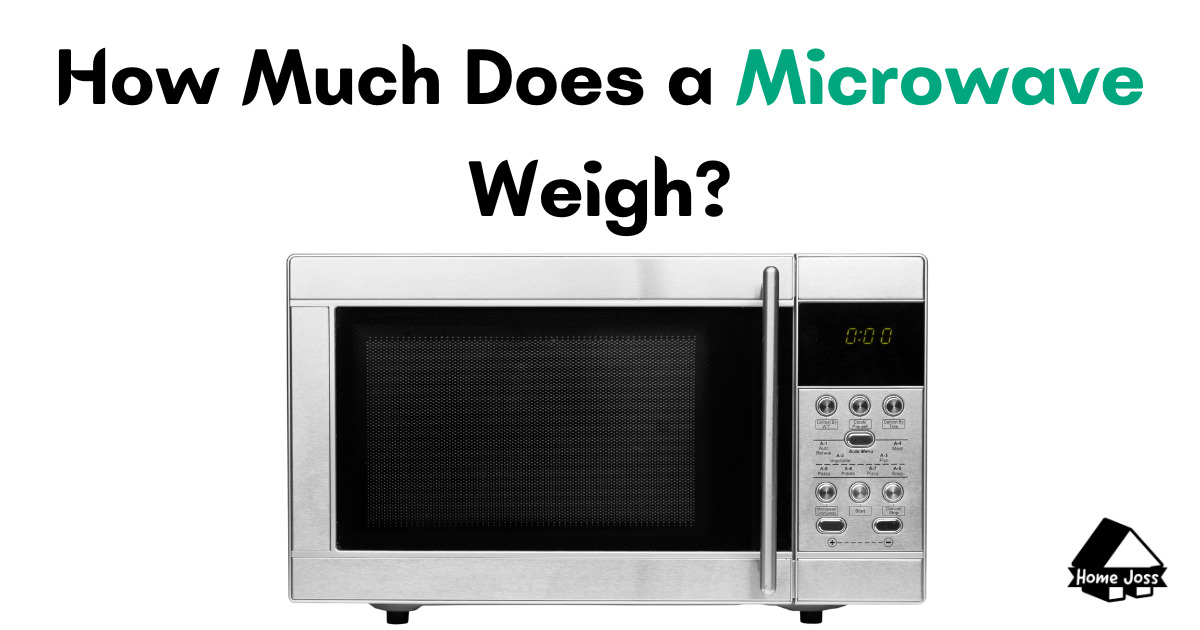If you’ve ever moved or shopped for a new microwave, you’ve probably wondered, “How much does a microwave weigh?” It’s a common question, especially when considering factors like portability, installation, and countertop space.
In this detailed guide, we’ll explore the weight of different types of microwaves, from compact countertop models to over-the-range and built-in options. So, let’s dive in and find out exactly how much microwaves weigh!

How to Find the Weight of a Microwave
If you’re specifically looking for the weight of a microwave, it’s best to check the product specifications online. Most retailers or manufacturers provide detailed information about the weight of the microwave in the product description.
Look for terms like “weight” or “shipping weight,” as the weight may include packaging materials and protective layers.
Understanding Microwave Sizes
Microwaves come in various sizes, and their weight often correlates with their capacity for cooking. Good Housekeeping categorizes microwaves into four sizes:
Compact
Compact microwaves are perfect for small spaces like dorm rooms or offices. They typically range from 0.5 to 1 cubic foot in size. While compact microwaves are lightweight and portable, their weight can vary between 20 and 30 pounds.
Mid-Size
Mid-size microwaves offer a bit more cooking space, ranging from 1 to 1.5 cubic feet. These microwaves weigh around 35 pounds on average.
Full-Size
Full-size microwaves, including over-the-range and wall-installed models, have a capacity of 1.6 to 2 cubic feet. Their weight can range from 40 to 100 pounds, depending on the brand and features.
Extra-Large
Extra-large microwaves, typically over 2 cubic feet in size, are commonly found in over-the-range configurations. These microwaves can weigh anywhere from 58 to 80 pounds, depending on the brand and specifications.
Microwave Weight Variations
Microwave weight can vary depending on factors such as size, style, and additional features. Let’s take a closer look at the weight variations within each microwave category:
Compact Microwaves
- Countertop: Countertop microwaves in the compact category usually weigh around 20 to 30 pounds. For example, both Sharp and GE 0.7 cubic-foot countertop microwaves weigh approximately 21 pounds.
Mid-Size Microwaves
- Countertop: Mid-size countertop microwaves, such as GE’s 1.4 cubic foot model, weigh around 34 pounds. Samsung’s 1.1 cubic-foot version weighs approximately 35 pounds.
Full-Size Microwaves
- Over-the-Range: Over-the-range microwaves like Whirlpool’s 1.7-cubic-foot model typically weigh 55 pounds. Frigidaire’s 1.8-cubic-foot over-the-range microwave weighs 62 pounds.
- Countertop: Several full-size countertop microwaves, ranging from 1.6 to 1.8 cubic feet, weigh between 40 and 50 pounds.
- Built-In: Built-in microwaves, like the Wolf 1.6 cubic-foot oven, weigh around 80 pounds. The Cafe’s 1.7 cubic-foot built-in microwave weighs 75 pounds.
Extra-Large Microwaves
- Over-the-Range: Extra-large, over-the-range microwaves can weigh between 65 and 80 pounds. For example, the Cafe brand’s 2.1 cubic-foot microwave weighs around 58 pounds.
Factors Affecting Microwave Weight
Microwave weight is influenced by various factors, including the style of the unit and its features. Here are some factors that can affect the weight of a microwave:
Unit Style
The style of the microwave plays a significant role in its weight. Different styles include:
- Countertop: Countertop microwaves are lightweight and designed for portable use. They are typically the lightest and most compact option.
- Over-the-Range: Over-the-range microwaves serve as both a microwave and a hood vent in the kitchen. They are relatively heavier due to their larger size and additional features.
- Built-In: Built-in microwaves are designed to seamlessly integrate with your kitchen cabinetry. They are heavier because of their installation requirements.
- Drawer Oven: Drawer microwaves offer convenient access and are installed at a lower height. They can vary in weight depending on the brand and size.
Additional Features
Microwaves can come with various additional features that may add weight to the unit. These features can include multiple cooking technologies, oven racks, child-locking mechanisms, and more. However, most of these additional features are electronic and weigh very little.
FAQ about How Much Does a Microwave Weigh
Are countertop microwaves lighter than built-in or over-the-range microwaves?
Yes, countertop microwaves are generally lighter and more portable than built-in or over-the-range microwaves.
Can microwave weight vary within the same size category?
A: Yes, microwave weight can vary within the same size category due to different brands, materials used, and additional features.
Q: What is the average weight of a compact countertop microwave?
A: Compact countertop microwaves typically weigh between 20 and 30 pounds.
Q: How heavy are over-the-range microwaves?
A: Over-the-range microwaves can weigh between 54 to 71 pounds on average.
Q: Do additional features like oven racks add significant weight to a microwave?
A: No, most additional features in microwaves, including oven racks, are electronic and do not add significant weight to the unit.
Q: Can the weight of a microwave affect its performance?
A: The weight of a microwave does not directly impact its performance. Performance is determined by factors such as power rating, cooking technologies, and features.
Q: Are built-in microwaves heavier than other types?
A: Built-in microwaves are generally heavier due to their installation requirements and the materials used for integration with cabinetry.
Q: Do larger microwaves always weigh more?
A: While larger microwaves typically weigh more, there can be variations depending on the brand, materials, and additional features.
Q: How can I determine the weight of a specific microwave model?
A: To find the weight of a specific microwave model, check the product specifications provided by the manufacturer or retailer online.
Q: Does the weight of a microwave affect its power or cooking capabilities?
A: No, the weight of a microwave does not directly impact its power or cooking capabilities. These factors are determined by the microwave’s wattage and cooking technologies.
When it comes to microwaves, weight varies depending on factors such as size, style, and additional features. Compact microwaves are the lightest, while full-size and extra-large microwaves tend to be heavier.
Countertop microwaves are generally more portable, while built-in and over-the-range microwaves are designed for specific installation requirements. Remember to check the product specifications for the weight of a specific microwave model you’re interested in.
Armed with this knowledge, you can now make an informed decision when purchasing a microwave that suits your needs and space requirements.






